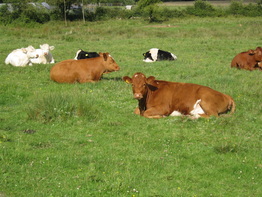 Cattle on the Commons
Cattle on the Commons
A right of common is a right to take certain produce off the land.
There are many such rights, including: pasturage (the right to put a specified number and type of animals onto the land to graze); pannage (the right to put pigs onto the land to eat acorns etc); turbary (the right to cut peat or turf for fuel); estovers (the right to take wood or bracken for fuel); piscary (the right to fish); and common in the soil (a right of mineral extraction).
Rights of common are legal rights which are usually tied to properties or land; they are not tied to a family name. After the Commons Act 2006, it became illegal to detach rights of common from the properties or land to which they are tied. If land with common rights is sold today, the rights transfer with the land to the new owner. On Assley, Hareley, Hawkesbury and Inglestone Commons, many of the local properties have rights of pasture.
Rights of common had to be registered most recently under the Commons Registration Act 1965. The commons register for Assley, Hareley, Hawkesbury and Inglestone Commons lists all of the rights registered against the Commons and is available for public inspection at South Gloucestershire Council.
Rights of common are an important part of the rich heritage of Assley, Hareley, Hawkesbury and Inglestone Commons. The Commons have significant nature conservation interest, and the farmers and property owners around the Commons who still exercise their grazing rights play an important part in managing these precious habitats for wildlife and in maintaining the open nature of the Commons. Without grazing, the wild flowers would soon be lost from the Commons; the grasses would become dominant in the sward, out-competing the flowers for space and light, and ultimately the Commons would start to scrub over.
There are many such rights, including: pasturage (the right to put a specified number and type of animals onto the land to graze); pannage (the right to put pigs onto the land to eat acorns etc); turbary (the right to cut peat or turf for fuel); estovers (the right to take wood or bracken for fuel); piscary (the right to fish); and common in the soil (a right of mineral extraction).
Rights of common are legal rights which are usually tied to properties or land; they are not tied to a family name. After the Commons Act 2006, it became illegal to detach rights of common from the properties or land to which they are tied. If land with common rights is sold today, the rights transfer with the land to the new owner. On Assley, Hareley, Hawkesbury and Inglestone Commons, many of the local properties have rights of pasture.
Rights of common had to be registered most recently under the Commons Registration Act 1965. The commons register for Assley, Hareley, Hawkesbury and Inglestone Commons lists all of the rights registered against the Commons and is available for public inspection at South Gloucestershire Council.
Rights of common are an important part of the rich heritage of Assley, Hareley, Hawkesbury and Inglestone Commons. The Commons have significant nature conservation interest, and the farmers and property owners around the Commons who still exercise their grazing rights play an important part in managing these precious habitats for wildlife and in maintaining the open nature of the Commons. Without grazing, the wild flowers would soon be lost from the Commons; the grasses would become dominant in the sward, out-competing the flowers for space and light, and ultimately the Commons would start to scrub over.